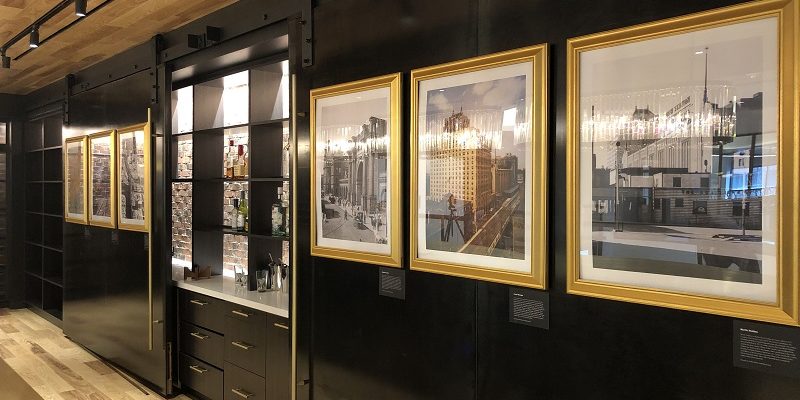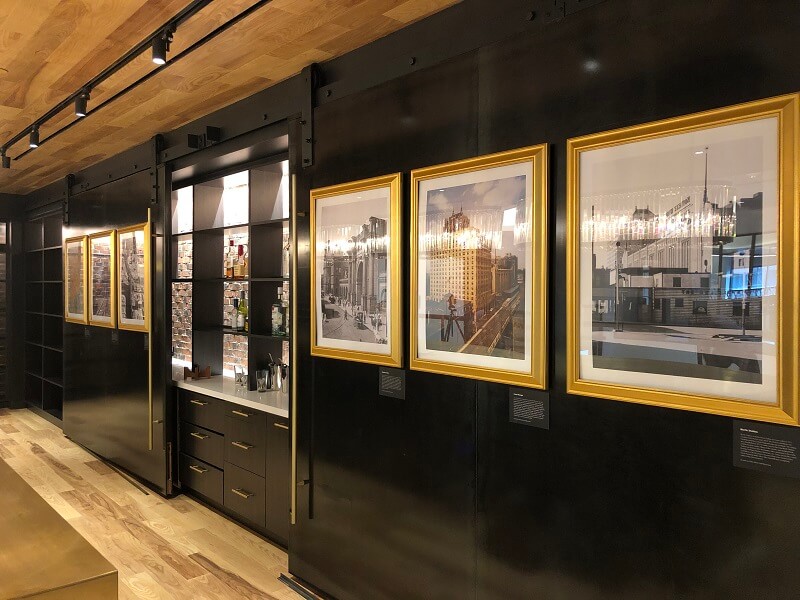Community Engagement: Partnerships & Donations; Vilna Shul; Opposing MGH
By keeping a focus on instances of “common history” — West End stories and experiences that residents of different eras share — the Museum has helped to bridge the gap that once existed between old and new West Enders. For example, Matt Ellis is considered a new West Ender, having grown up in the Charles River Apartments, which sprouted where tenements once stood. Arthur Geller is an old West Ender, raised in the neighborhood prior to urban renewal. And yet, both of them went to the Peter Faneuil School. That gives them common history and common ground. The Museum has revitalized its focus on common history, leading people like Bryan Koop of Boston Properties and Henry Barr, a Jewish Heritage Month honoree, to feel included in the story of the West End. That inclusivity has helped bring about a new era of community engagement.
Partnerships & Donations
Alongside a fresh crop of businesses, restaurants, and residences, a new sense of community spirit is on the rise in today’s West End. A longtime advocate for former residents cast aside in the name of progress, The West End Museum now finds itself being embraced by its new neighbors. Here are just a few signs of the most welcome change:
In July, Rapid7 – a software security solutions company – relocated its global headquarters to The Hub on Causeway, adjacent to the TD Garden and just steps from the Museum. A modern “speakeasy” for post-work relaxation and socializing sits within the company’s 147,000 square feet of office space. In addition to committing to a recurring annual donation to the Museum, Rapid7 engaged our Director Duane Lucia to curate two exhibits per year in the speakeasy. The first of those, “300 Years of Change Along the Causeway,” features images curated from the Museum’s archives, and Lucia gave a corresponding talk to Rapid7 employees at the end of August.
On September 20, Star Market – Hub on Causeway held a ribbon-cutting and grand opening. The market invited Museum representatives and presented them with a donation as part of the celebration. The colossal two-story, 60,000 square-foot store includes a Starbucks and a Pizzeria Regina as well as a full-service pharmacy, a bakery, a liquor store, and a sprawling array of the chain’s traditional and specialty fare. Area seniors will enjoy special discounts the first Saturday of each month and a weekly drop-off shuttle service.
In addition, funding for the Museum will be an annual earmark in the Massachusetts state budget beginning in 2020. Plus, Ellis Strategies, a Boston-based public relations firm, and AECOM Tishman Construction Company recently made generous donations.
The Vilna Shul
The Vilna Shul is the only immigrant-era synagogue building that survived the West End urban renewal project. Dating back to the early 1900s, the Vilna served as a place of worship and community for the large Jewish immigrant population on the north slope of Beacon Hill and in the West End. Today, The Vilna Shul/Boston’s Center for Jewish Culture, describes itself as “a place where the history of Boston’s Jews can be shared and enjoyed by everyone and where Boston Jewish life thrives once again.” The Vilna and The West End Museum share a longstanding relationship, but recent developments have reinvigorated that bond. When several programs could not be held in the synagogue building due to significant renovations, organizers turned to the Museum. A number of Vilna Shul events, including “The Jews of Spain Today with Author Susan Solomont” and Televising Teshuvah (Repentance): Yom Kippur on the Small Screen with Rachel Greenblatt,” have been held at the Museum and there may be more to come.
Opposition to MGH Proposal
Massachusetts General Hospital (MGH) recently revealed an expansion plan, which would destroy three of only a handful of buildings that survived urban renewal in the old West End: the Winchell School at 26 Blossom St., the tenement house at 25 North Anderson St. and the West End House at 16-18 Blossom St.
The proposed construction would reportedly include a pair of connected 12-story towers with underground parking. The buildings would accommodate a cancer center and a heart center, space for various inpatient and outpatient services, and about 450 single-patient rooms.
The West End Museum and a handful of other neighborhood organizations have banded together in opposition to the plan. The Museum and its cohorts respect MGH and its mission, but as our Director Duane Lucia wrote – with the full support of the Museum Board – in an opinion piece published by the Boston Business Journal, “The demolition of these buildings will continue to erode a period of Boston history it is essential that we remember. The buildings serve as reminders of a diverse multi-ethnic immigrant community that lived in the North Anderson tenement, was educated at the Winchell School, and was cultured toward excellence at the West End House.” See Lucia’s full letter here.
Greg Galer, executive director of the Boston Preservation Alliance, penned a letter to Jonathan Greeley, director of development review for the Boston Planning & Development Agency (BPDA; formerly the Boston Redevelopment Authority [BRA]). Greeley is overseeing the MGH project for the BPDA. The Museum co-signed Galer’s letter along with the West End Civic Association, Historic New England, Friends of the West End Library, Old West End Housing Corp., and Boston by Foot. Read the letter here.
According to a Beacon Hill Times article, the hospital contacted Galer and is exploring alternatives to demolition of the historical buildings in play. In an official statement, MGH Vice President for Real Estate and Facilities David Hanitchak said, “As a West End neighbor for more than 200 years, the hospital is committed to preserving the neighborhood’s rich history through thoughtful collaboration with area residents. While much of the planning is in the early stages, we look forward to sharing more information as the process continues.”
We will continue to report on this story but additional support will help the cause. We encourage you to contact the BPDA at 617.722.4300 or via its website contact form to express your opposition.
[Edit] As of 2020, the Museum, Boston Preservation Alliance, and other community organizations are no longer opposing the Mass General Project. MGH has put significant effort into engaging with us and other community groups to find a solution that allows them to move forward while compensating the neighborhood for the loss of these historic structures.



